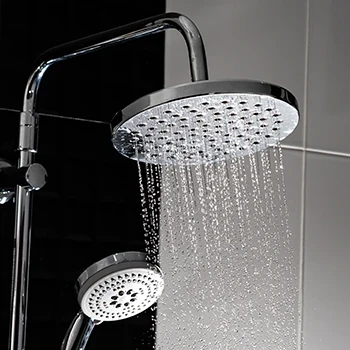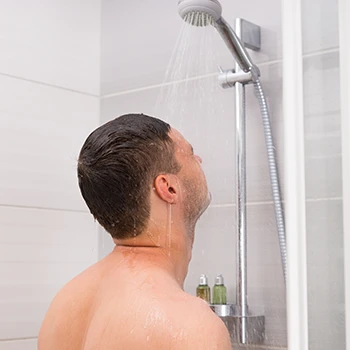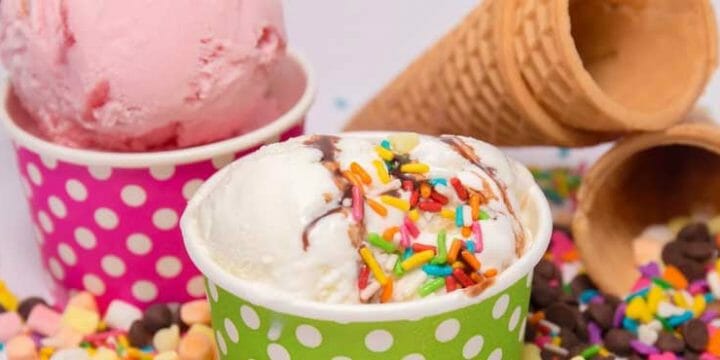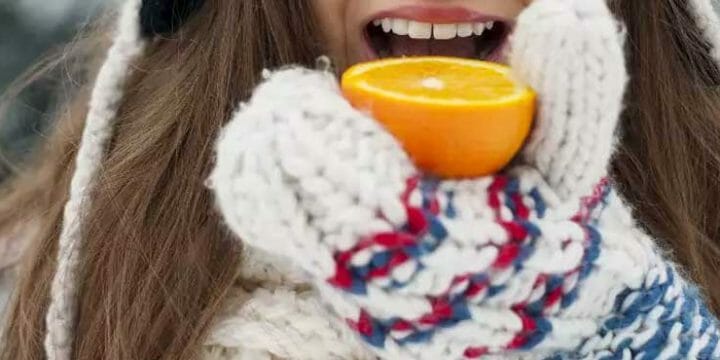To avoid testosterone therapy (TRT), many of my fitness clients ask me whether some tips and tricks, like taking a cold shower, can boost their testosterone levels.
Drawing from my expertise in sport science, I delved into research and consulted with an endocrinologist to deepen my understanding of how cold water stimulation impacts testosterone levels.
Let’s dive in.
Quick Summary
Do Cold Showers Increase Testosterone?

Cold showers may contribute to increased testosterone levels by maintaining optimal testicular temperature, which is crucial for healthy sperm production and potentially beneficial for hormonal balance.
In my practice, I've noticed that avoiding hot showers can be beneficial. Echoing the University of Oregon's findings, cooler showers may reverse heat's adverse effects on sperm production [1].
Fun fact: Wistar rats' tiny testes are pretty much like ours, perfect for studying how temperature messes with sperm and testosterone.
A 2000 study, published in the Endocrinology journal, shows rats exposed to heat for 15 minutes lost significant testicular weight, decreasing to 65.4% of control levels, and had lower testosterone levels than the control group rats [2].
So, hot showers crank up body temperature, especially around the testes, dropping T-levels and sperm count. It makes sense, then, that a cold shower or ice bath could give these a boost.
But hold on, while cold showers seem like an ace for sperm production, their testosterone-boosting powers are less clear-cut.
Let's dig deeper into this chilly mystery.
Cold Showers and Testosterone: The Research

There is countless research on the effects of testosterone and male fertility as affected by low and high temperatures.
Sperm Production
Here is some research regarding temperatures and sperm production:
- Oxidative Medicine and Cellular Longevity research pinpoints the sweet spot for testicular temperature: 88 to 99 degrees Fahrenheit. This zone's perfect for cranking out top-notch DNA, RNA, and proteins, leading to more sperm [3].
- Chilly temps polish up sperm shape and movement, says a study in the American Journal of Obstetrics and Gynecology [4].
- Ditch the hot baths and showers, and you might see sperm counts rocket by 491%, according to the 2007 study in the International Brazilian Journal of Urology [5].
Testosterone Levels
These other studies evaluate the effects of cold exposure related to testosterone levels:
- The Infectious Agents and Cancer journal found that short, daily cold snaps can drop testosterone levels in the blood [6]. Though this research wasn't shower-specific, it highlights how cooler temperatures tweak serum testosterone.
- The cold doesn't fuss with serum testosterone, but physical workouts do. They boost luteinizing hormone and noradrenaline, per a study published in the Japanese Journal of Hygiene [7].
- A study in the Journal of Strength and Conditioning Research saw a testosterone surge in saliva tests 24 hours after cold exposure post-sprint [8]. It's likely the body's muscle-saving response to what it thinks is a dangerous cold.
This boost is likely due to the body’s response to what it perceives as dangerous cold exposure, so it releases proteins to prevent muscle tissue from wasting away, potentially boosting testosterone naturally.
Other Benefits

Cold showers might boost testosterone and sperm production, and they come with added benefits.
This practice isn't new; it's been around for over 5000 years, from the time of Hippocrates to the 17th century, when John Floyer highlighted the health perks in his work on bathing [9].
“The use of cold was advocated by the pioneering Greek physicians Hippocrates and Galen to help balance bodily humors. In fact, Galen is known to have invented ‘cold cream,’ which is still popular today, although he advocated it for treating fever rather than as a moisturizer.”
- Dr. Phil Jaekl, PhD
Let's dive into what today's research says about cold showers' effects.
Increased Energy
From my perspective, cold showers are like a natural energy shot. When I finish with the shower, I feel an incredible amount of energy and an increased mood.
The Sports Medicine journal adds that cold water, especially followed by heat, can also ease muscle soreness [10].
Boosted Immunity
A 2016 PLOS One journal study revealed a 29% drop in work sick days after regular cold showers [11]. Plus, Intensive Care Medicine Experimental highlights that cold water sparks adrenaline, boosting white blood cells and fighting off illness [12].
Increased Circulation

When cold water hits your skin, it tightens surface blood flow, making deeper tissues work harder to stay warm, according to the Temperature journal [13].
Faster Metabolism
Brace yourself: an ice-cold shower can kick your metabolism into gear.
The Handbook of Clinical Neurology notes that this chilly shock triggers non-shivering thermogenesis, burning calories to warm you up [14].
“Cold temperatures activate the brown or good fat in the body. When brown fat is activated, it keeps the body warm by burning calories; it may also increase your energy and metabolism and help control your blood sugar. That could reduce your risk of obesity and diabetes."
- Dr. Geert Buijze, an Orthopaedic Surgeon at Academic Medical Center
A 2000 study in the European Journal of Applied Physiology revealed that immersion in cold water at 14 degrees Celsius remarkably increased metabolic rate by 350%, highlighting the significant impact of cold exposure on the body's energy expenditure [15].
Improved Post-Workout Recovery
As a performance coach, I often recommend cold therapy, like ice baths, for post-workout recovery.
A case study in the abovementioned Intensive Care Medicine Experimental shows it can lessen muscle pain and speed up recovery for martial artists and marathon runners [16].
How to Take a Cold Shower

To safely incorporate cold showers into your routine, start with shorter exposure and gradually increase the duration, always being mindful of your body's response and consulting a healthcare professional if you have underlying health conditions.
While cold showers can be startling, here's my guide to acclimatizing:
- Gradual Chill: Don't rush to freezing temps. Start with warm water and ease down to cool, then cold. This lets your body adapt without the shock.
- Piece by Piece: First, splash your face, arms, and feet before going full cold. It's less of a shock to your system.
- Stay Cozy: I always suggest having a warm towel or spot-ready post-shower to prevent shivering.
- Consistency is Key: I’ve found that the real benefits of cold showers come with regular practice.
FAQs
What Is the Best Time to Take a Cold Shower?
The best time to take a cold shower is in the morning because it gives you a physical and mental jumpstart, increases circulation, and can improve immunity.
Do Cold Showers Increase Sperm Count?
Cold showers may increase the sperm count. In theory, the cold water temperature would keep the scrotum at an optimal temperature, allowing the testes to produce maximum sperm and testosterone, while warm or hot temperatures can reduce production.
Why Should Men Take Cold Showers?
Men should take cold showers because they can improve blood flow, lower scrotal temperature (promoting sperm and testosterone production), increase alertness, enhance mental clarity, and boost immunity.
Are Cold Showers Good For Fertility?
Cold showers can be good for fertility for men because they can counteract the reduction in sperm that warm or hot showers may bring about. No research suggests water temperature has an impact on women’s fertility.
References:
- https://www.sciencedaily.com/releases/2020/10/201023095855.htm
- https://academic.oup.com/endo/article/141/4/1414/2988074
- https://www.ncbi.nlm.nih.gov/pmc/articles/PMC4737001/
- https://www.ajog.org/article/S0002-9378(13)00146-4/abstract
- https://pubmed.ncbi.nlm.nih.gov/17335598/
- https://infectagentscancer.biomedcentral.com/articles/10.1186/1750-9378-2-20
- https://pubmed.ncbi.nlm.nih.gov/1890772/
- https://pubmed.ncbi.nlm.nih.gov/27227791/
- https://quod.lib.umich.edu/e/eebo/A39842.0001.001?view=toc
- https://www.ncbi.nlm.nih.gov/pmc/articles/PMC4802003/
- https://www.ncbi.nlm.nih.gov/pmc/articles/PMC5025014/
- https://www.ncbi.nlm.nih.gov/pmc/articles/PMC4798560/
- https://www.ncbi.nlm.nih.gov/pmc/articles/PMC4843861/
- https://www.sciencedirect.com/topics/medicine-and-dentistry/nonshivering-thermogenesis
- https://pubmed.ncbi.nlm.nih.gov/10751106/
- https://www.ncbi.nlm.nih.gov/pmc/articles/PMC4798560/
About The Author
You May Also Like






